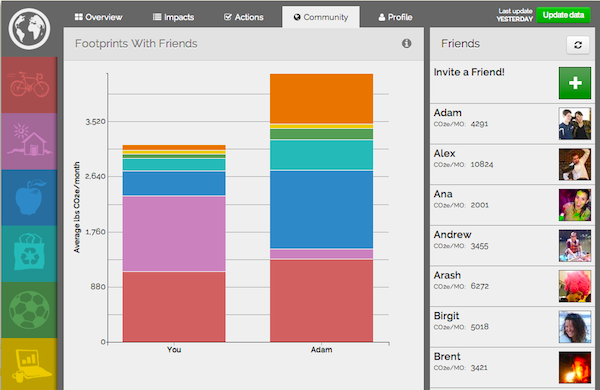So you think you’re doing your part to help climate change: you drive a hybrid, shop at Whole Foods, you recycle more than you throw away, and you never forget your cloth shopping bags. And like many people, you’d like to be doing more to help preserve the environment, but you aren’t exactly sure how. Shop local vs. organic, grass-fed vs. free-range, sustainable vs. natural, the bus or the subway—the difference between bad and good isn’t always clear.
Oroeco, a creative start-up web platform that enables people to track how their social and environmental values correlate with their everyday buying, investing and other lifestyle decisions will spell it out for you and give you the numbers. The platform makes it clear that consumption and climate change are linked, and that our small choices really do matter. Every choice we make as consumers, has an impact on the global environment including the foods we eat, the clothes we wear, how we get around, and the places we invest our money are all part of a single web.
Ian Monroe, lecturer on Energy & Climate at Stanford University, is the CEO behind Oroeco, along with what he refers to as “a group of friends and like-minded tech enthusiasts who want to use tech to bridge the gap between what we say, we believe and what we actually do.”
Oroeco works by putting a carbon value on everything we consume because the greenhouse gases that cause climate change can all be traced back to how we spend our money. By hooking up personal financial data such as investments, bank accounts and credit cards via Mint.com, Oroeco keeps track of your spending information and in turn estimates the impact you are having on the environment using numbers that reflect general estimates and averages of the emissions from producing and disposing of a category of products. In turn, the numbers give you a clear picture of exactly how much you are contributing to global warming. In the future, the company plans to add estimates specific to the manufacturing of goods as well.
And Oroeco encourages constructive competition by including a feature that allows users to keep track of how they are doing compared with friends, family members, co-workers, residents of other zip codes and Facebook friends. In addition to raising awareness about climate change, the site involves social games, tips, points, and prizes, to encourage a sustainable lifestyle:

According to Monroe, “Carbon values don’t mean much for most of us, which is why Oroeco is focused on showing you how you’re doing vs. what’s “normal” in your area, as well as how you’re doing vs. your Facebook friends. We all want to think we’re better than average.” Monroe says that making our carbon footprints visible to others holds us publicly accountable, making us much more likely to want to reduce our footprint which in turn will improve the average, and drive what he refers to as a “virtuous cycle” of continuous improvement for individuals and companies. “We’re all causing the problem, we all need to be part of the solution, and we are the most effective messengers for our friends and family” says Monroe.
In addition, an average Oroeco user will learn a lot about the impact of their everyday decisions. For example, if you’re planning a tropical vacation, you’ll see that the most climate-friendly destination is whatever is closest to you, so if you live in Los Angeles, a smarter choice is Hawaii instead of Thailand, or if you really want to make the greenest choice, plan a stay-cation. “Flying is a huge piece of many people’s climate footprint,” says Monroe, including his own he admits. Turns out, the only way to reduce your impacts from flying is to either not fly, or offset your flights with carbon offsets. Oroeco has partnered with Impact Carbon to offer carbon offsets for those who might occasionally need to make up for activities such as air travel.
There are also plenty of ways to learn to save money and shrink your carbon footprint, like always washing your laundry with cold water. The UC Berkeley CoolClimate group that Oroeco is partnered with found the average household can reduce their climate pollution by 20% while also saving over $1,000 per year.
The Oroeco website also lists some fun facts that may surprise even the well eco-educated. For instance, most people save more emissions and money by eating red meat one day less a week than they’d save eating all organic and local foods, or driving a Prius. Or that reducing your highway speed from 70 to 65 MPH and avoiding rapid acceleration can save over one ton of carbon dioxide equivalent and $300 per year.
Personal choices aside, the real goal of Oroeco is helping to promote change with information and creating a shift towards sustainability on a global scale according to Monroe. We can make choices that will lessen our carbon footprint but ultimately, businesses won’t cleanup unless we stop buying and investing in their products, politicians won’t enact meaningful policies unless we speak up, and friends and neighbors won’t change their lifestyles unless they see others around them doing the same.
